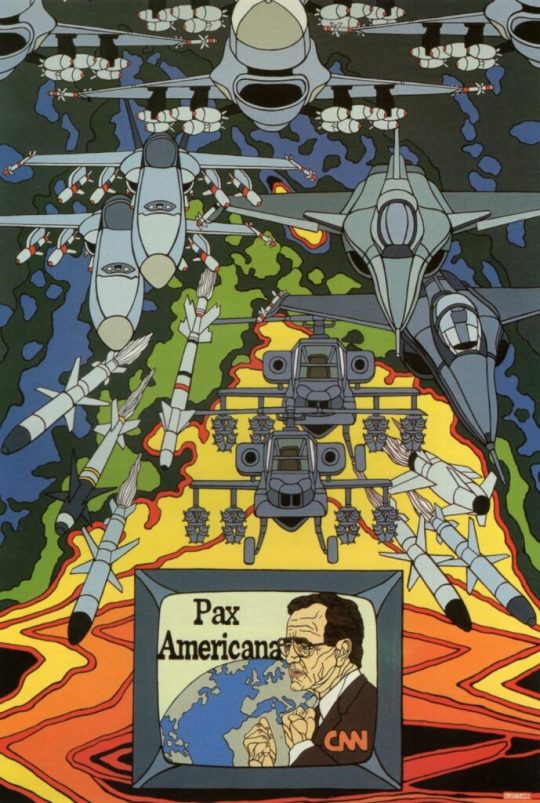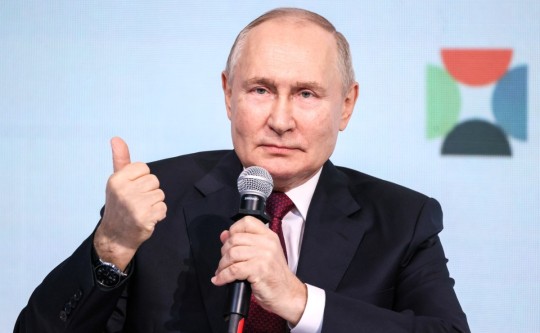#pax americana
Text

Giorgos Ioannou (1926-2017) — Pax Americana No. 2 [oil on canvas, 1991]
176 notes
·
View notes
Text
Earth-4: Home of Pax Americana, which includes heroes such as Peacemaker, Blue Beetle, Nightshade, The Question, and the only super human on Earth, Captain Allen Adam

#earth 4#active heroes:#pax americana#Blue Beetle#Peacemaker#Nightshade#The Question#Captain Allen Adam#this is an earth with only one singular metahuman in the entire world (captain atom)#<<in case that's a selling point for you#dc comics#dc multiverse#dc multiverse week
36 notes
·
View notes
Quote
No high speed trains. No universal health care. No viable Covid relief program. No respite from 8.3 percent inflation. No infrastructure programs to repair decaying roads and bridges, which require $41.8 billion to fix the 43,586 structurally deficient bridges, on average 68 years old. No forgiveness of $1.7 trillion in student debt. No addressing income inequality. No program to feed the 17 million children who go to bed each night hungry. No rational gun control or curbing of the epidemic of nihilistic violence and mass shootings. No help for the 100,000 Americans who die each year of drug overdoses. No minimum wage of $15 an hour to counter 44 years of wage stagnation. No respite from gas prices that are projected to hit $6 a gallon.
Chris Hedges, No Way Out but War
440 notes
·
View notes
Text

AMERICANA
#usa#america#united states#sotu#americana#va#veterans affairs#veterans#pax americana#LIFE#retro#art#flashback#apple pie#world war 2#world war ii#u.s.a.
7 notes
·
View notes
Text
“For the generation of Americans who came of age in the shadow of the September 11 attacks, the world America had made came with a question mark. Their formative experiences were the ones in which American power had been used for ill, in Iraq and Afghanistan. In the Middle East more broadly, and for much longer, the United States had built a security architecture around some of the world’s most repressive regimes. For those on the left, this was nothing new, and it was all too obvious. I spent my college years reading Noam Chomsky and other leftist critics of U.S. foreign policy, and they weren’t entirely wrong. On balance, the U.S. may have been a force for good, but in particular regions and at particular times, it had been anything but.
Blaming America first became all too easy. After September 11, U.S. power was as overwhelming as it was uncontested. That it was squandered on two endless wars made it convenient to focus on America’s sins, while underplaying Russia’s and China’s growing ambitions.
(…)
Russia’s unprovoked attack on a sovereign nation, in Europe no less, has put matters back in their proper framing. The question of whether the United States is a uniquely malevolent force in global politics has been resolved. In the span of a few days, skeptics of American power have gotten a taste of what a world where America grows weak and Russia grows strong looks like. Of course, there are still holdouts who insist on seeing the United States as the provocateur. In its only public statement on Ukraine, the Democratic Socialists of America condemned Russia’s invasion but also called for “the U.S. to withdraw from NATO and to end the imperialist expansionism that set the stage for this conflict.” This is an odd statement considering that Russia, rather than the United States, has been the world’s most unabashedly imperialist force for the past three decades. But many on the anti-imperialist left aren’t really anti-imperialist; they just have an instinctive aversion to American power.
America’s low opinion of its own capacity for good — and the resulting desire to retreat or disengage — hasn’t just been a preoccupation of the far left. The crisis of confidence has been pervasive, spreading to the halls of power and even President Barack Obama, whose memorable mantra was “Don’t do stupid sh*t.” Instead of thinking about what we could do, or what we could do better, Obama was more interested in a self-limiting principle. For their part, European powers — content to bask under their U.S. security umbrella — could afford to believe in fantasies of perpetual peace. Europe’s gentleness and lethargy — coaxing Germany to commit even 2% of its GDP to defense seemed impossible — became something of a joke. One popular Twitter account, @ISEUConcerned, devoted itself to mocking the European Union’s propensity to express “concern,” but do little else, whenever something bad happened.
(…)
The coming weeks, months, and years are likely to be as fascinating as they are terrifying. In a sense, we knew that a great confrontation was coming, even if we hadn’t quite envisioned its precise contours. At the start of his presidency, Joe Biden declared that the battle between democracies and autocracies would be the defining struggle of our time. This was grandiose rhetoric, but was it more than that? What does it actually mean to fight such a battle?
In any number of ways, Russia’s aggression has underscored why Biden was right and why authoritarians — and the authoritarian idea itself — are such a threat to peace and stability. Russia invaded Ukraine, a democracy, because of the recklessness and domination of one man, Vladimir Putin. The countries that have rallied most enthusiastically behind Ukraine have almost uniformly been democracies, chief among them the United States. America is lousy, disappointing, and maddeningly hypocritical in its conduct abroad, but the notion of any moral equivalence between the United States and Putin’s Russia has been rendered laughable. And if there is such a thing as a better world, then anti-imperialists may find themselves in the odd position of hoping and praying for the health and longevity of not just the West but of Western power.”
“The “rules-based world order” is a system of norms and values that describe how the world ought to work, not how it actually works. This aspirational order is rooted in the idealistic aftermath of the Second World War, when it was transcribed into a series of documents: the United Nations Charter, the Universal Declaration of Human Rights, the UN Genocide Convention, and the Geneva Conventions on the laws of war, among others. In the more than seven decades since they were written, these documents have frequently been ignored. The UN Genocide Convention did not prevent genocide in Rwanda. The Geneva Conventions did not stop the Vietnamese from torturing American prisoners of war, did not prevent Americans at Abu Ghraib from torturing Iraqi prisoners of war, and do not prevent Russians from torturing Ukrainian prisoners of war today. Signatories of the Universal Declaration of Human Rights include known violators of human rights, among them China, Cuba, Iran, and Venezuela. The UN Commission on Human Rights deteriorated into parody long ago.
Nevertheless, these documents have influenced real behavior in the real world. Soviet dissidents used to embarrass their government by pointing to human-rights language in treaties the Kremlin had signed and did not respect. Even when fighting brutal or colonial wars, countries that had signed treaties on the laws of war either tried to abide by them—avoiding civilian casualties, for example—or at least felt remorseful when they failed to do so. Americans who mistreated Iraqi prisoners of war were court-martialed, convicted, and sentenced to time in military prisons. The British still agonize over the past behavior of their soldiers in Northern Ireland, and the French over theirs in Algeria.
The Russian invasion of Ukraine and Hamas’s surprise attack on Israeli civilians are both blatant rejections of that rules-based world order, and they herald something new. Both aggressors have deployed a sophisticated, militarized, modern form of terrorism, and they do not feel apologetic or embarrassed about this at all. Terrorists, by definition, are not fighting conventional wars and do not obey the laws of war. Instead, they deliberately create fear and chaos among civilian populations. Although terrorist tactics are usually associated with small revolutionary movements or clandestine groups, terrorism is now simply part of the way Russia fights wars. Although a sovereign state and a permanent member of the UN Security Council, Russia first began deliberately hitting civilian targets in Syria in 2015, including power stations, water plants, and above all hospitals and medical facilities, 25 of which were hit in a single month in 2019. These attacks were unquestionably war crimes, and those who chose the targets knew they were war crimes. Some of the hospitals had shared their coordinates with the UN to avoid being hit. Instead, Russian and Syrian government forces may have used that information to find them.
(…)
The Hamas terrorists paid no attention to any modern laws of war, or any norms of any kind: Like the Russians, Hamas and its Iranian backers (who are also Russian allies) run nihilistic regimes whose goal is to undo whatever remains of the rules-based world order, and to put anarchy in its place. They did not hide their war crimes. Instead, they filmed them and circulated the videos online. Their goal was not to gain territory or engage an army, but rather to create misery and anger. Which they have—and not only in Israel. Hamas had to have anticipated a massive retaliation in Gaza, and indeed that retaliation has begun. As a result, hundreds if not thousands of Palestinian civilians will now be victims too.
To explain why one permanent member of the UN Security Council and one quasi-state have adopted this kind of behavior, it is best to start with the nature of their own totalitarian regimes. But there is plenty more blame to go around, because the rules-based order, always pretty tenuous, has actually been dying for a long time. Autocracies, led by China, have been seeking to undermine or remove language about human rights and the rule of law from international forums for years, replacing it with the language of “sovereignty.” Not that this is just a matter of language: The Chinese have carried out atrocities against their Uyghur minority for years, so far with impunity, and openly conducted a successful assault on the rights of the population of Hong Kong. They, and others, have also indulged in deliberately provocative behavior, designed to mock the rule of law outside their own borders. Belarus got away with forcing an Irish-owned airplane to land in Minsk and then kidnapping one of its citizens who was onboard. Russia has organized murders of its citizens in London, Washington, and Berlin.
(…)
During its lifetime, the aspirational rules-based world order and the international community that supported it were frequently mocked, and rightly so. The crocodile tears of the statesmen who expressed “profound concern” when their unenforced rules were broken were often unbearable. Their hypocrisy, as they opined on distant conflicts, was intolerable. On Saturday, Russia’s deputy defense minister parodied this kind of talk when he called for “peace” between Israel and Hamas based on “recognized agreements,” as if Russia accepted any “recognized agreements” as a basis for “peace” in Ukraine.
But like the equally outdated Pax Americana that accompanied the rules-based world order—the expectation that the U.S. plays some role in the resolution of every conflict—we might miss the Geneva Conventions when they are gone. Open brutality has again become celebrated in international conflicts, and a long time may pass before anything else replaces it.”
“The history of Armenians in Nagorno-Karabakh was ended in the old manner of conflict resolution: siege, conquest, expulsion. After a 10-month blockade, Azerbaijan launched an attack on Sept. 19, claiming the enclave in a day and causing nearly the entire ethnic Armenian population to flee. Give war a chance, as the saying goes.
For Armenians, a classic relic ethnic minority whose Christianity and peculiar alphabet date to the epic struggles between the Romans and the Parthians, it was another genocide. For the Azerbaijanis, Turkic in language and historically Shia Muslim, a great triumph. Yet despite appearances, the conflict is not a Samuel Huntington-style clash of civilizations. Instead, in its emboldening of traditional regional powers like Turkey, scrambling for geopolitical spoils after the retreat of superpowers, it’s a harbinger of the coming world disorder.
(…)
In the chaotic aftermath of Soviet collapse, the Armenians undertook to defend Nagorno-Karabakh by force. Instead of poetic intellectuals, the wartime generation of Armenian leaders became militia commanders. They proved earthier and, soon, brazenly corrupt. Defending the country became their sole means of legitimacy, ruling out the concessions that peace would require. By 1994 the Armenians, mobilizing around the traumatic memories of genocide, succeeded in expelling scores of Azeris from the enclave. Last month, Azerbaijan got more than even.
In that project, it had a powerful backer: Turkey. President Recep Tayyip Erdogan, a master of vertiginous visions, has already tried Islamic liberalism, joining Europe, leading the Arab revolts, challenging Israel and negotiating peace in Ukraine. He now has another dream: opening a geopolitical corridor from Europe through Central Asia, all the way to China. This is the “Zangezur corridor,” a 25-mile-long strip of land to be carved through Armenia as part of a peace deal imposed at gunpoint.
Iran is not happy with Azerbaijan’s victory. As openly as the Iranians ever do, they’ve threatened to use force against any changes to the borders of Armenia. Iran, a millenniums-old civilization central to a whole continent, cannot tolerate being walled off behind a chain of Turkish dependencies. India, similarly, is on Armenia’s side and has been sending a regular supply of weapons. One spur for such support, no doubt, is Pakistan’s joining the Azeri-Turkish alliance. In the jargon of American lawyers, this opens a whole new can of worms.
Then there’s Russia, whose absence from the denouement in Nagorno-Karabakh was striking. Even after the 1990s, Moscow still remained by far the biggest supplier of weapons to both Armenia and Azerbaijan. Their economies and societies, above all the elites and their corruption networks, were until very recently molded together. What we are seeing now, as both nations slip out of Russia’s orbit, might be the second round of Soviet collapse.
(…)
That brought nearly all the perimeter of the former Soviet Union into Russia’s sphere of influence. Rebellious Belarus, its dictator dependent on Russian support, was in hand; so too the war-torn Caucasus. The large and oil-rich Kazakhstan itself requested Russian peacekeepers during a bewildering bout of street violence in January 2022. Strangely, the elite Russian troops soon departed from Kazakhstan. A month later, the whole world realized that they had been dispatched to Ukraine, the last sizable piece of Mr. Putin’s post-Soviet gambit. And there his plan broke down.
History has a habit of serving the same lessons with changed variables. In 1988, it was the dreamer Gorbachev stumbling over Nagorno-Karabakh that unwittingly shattered the world order. Today, Mr. Putin could become the second, much darker incarnation of the Kremlin aggrandizer going awry on all fronts. The consequences — from emboldening international aggression to reanimating the West under the banner of NATO — will be profound. As events in Nagorno-Karabakh show, the fragile post-Cold War order is giving way to something else entirely.
The Caucasus might seem strange and distant. Yet it might prove the wedge that turns the fortunes of world order. Trieste, Smyrna, Sarajevo, Danzig and Crimea were all such places. Let us not have to relearn history at the cost of yet another ethnic cleansing.”
#russia#ukraine#israel#gaza#hamas#nagorno karabakh#armenia#azerbaijan#geopolitics#world order#pax americana#war#wwiii#anne applebaum#shadi hamid#war crimes#genocide
9 notes
·
View notes
Text
“ Gli Stati Uniti d’America hanno combattuto oltre un centinaio di conflitti in due secoli e mezzo. Fra guerre mondiali e spedizioni di taglia minima, la neonazione inventata dai ribelli antibritannici ha imbracciato le armi più di ogni altra al mondo. Guerre quasi tutte vittoriose nel primo secolo e mezzo, tutte perse o non vinte dopo il 1945. L’ultima e più lunga (2001-2021) è (stata?) quella contro il terrorismo. Modello di uso a-strategico della forza in quanto sfida a un nemico indefinito e cangiante. Conflitto potenzialmente infinito, certamente invincibile. Infatti straperso con il suggello della tragica fuga dall’Afghanistan, il 15 agosto 2021, che si scoprirà prologo del 24 febbraio 2022. La Pax americana è chimera.
Logica imperiale impone di distinguere fra conflitti inevitabili e inutili. I primi, strategici e di imponenti dimensioni, aprono e chiudono fasi della potenza, fissano il rango della nazione fra le altre, segnano la storia universale. Decidono. I secondi accelerano l’entropia del sistema. Derive tattiche antimperiali, che accumulandosi possono indurre negativi effetti strategici. Gli americani hanno ingaggiato e vinto cinque conflitti strategici: il primo, istitutivo dello Stato, è Guerra di indipendenza (1776-1783); il secondo, fondativo della nazione, cosiddetta Guerra di secessione (1861-1865); il terzo, contro la Spagna (1898), termina con il controllo di Cuba e l’acquisizione della prima e ultima colonia, le Filippine, di cui la repubblica non sa che fare; il quarto, Prima guerra mondiale (1917-1918), combattuto nel continente di origine, getta le basi dell’impero; il quinto, Seconda guerra mondiale (1941-1945), lo sigilla. E stabilisce la diffusa presenza militare nel mondo. Eccesso di responsabilità da cui scaturisce il rischio di logorarsi in conflitti insieme antimperiali e antinazionali, perché minano la credibilità americana nel mondo e la disponibilità della nazione a sostenerla. Rischio brillantemente gestito grazie all’antemurale sovietico, ma ormai fuori controllo.
Le Forze armate americane riunite formano una massa di oltre due milioni e duecentomila soldati. Considerandone le ramificazioni, fra cui diciassette milioni di veterani più rispettive famiglie, un americano su tre ha o ha avuto a che fare con la guerra. In termini relativi, nessun’altra potenza esibisce un rapporto simile fra comunità militare e popolazione totale. Coltello a doppio taglio. Formidabile deterrente contro ogni rivale. Ma anche tentazione permanente a risolvere le controversie internazionali armi in pugno, sottoponendo il paese a stress continui, difficilmente giustificabili. Non era questa la postura auspicata dai fondatori.
La disposizione alla violenza degli americani, testimoniata dalla diffusione delle armi e delle milizie armate, non è frutto dell’organizzazione dello Stato ma del temperamento bellicoso della nazione. “
Lucio Caracciolo, La pace è finita. Così ricomincia la storia in Europa, Feltrinelli (collana Varia), novembre 2022. [Libro elettronico]
#letture#scritti saggistici#saggistica#saggi brevi#geopolitica#Lucio Caracciolo#leggere#citazioni#militarismo#terrorismo#Stati Uniti d’America#imperialismo#colonialismo#europeismo#Guerra di indipendenza americana#Americani#Pax americana#Guerra di secessione#Filippine#Afghanistan#ordine mondiale#Prima guerra mondiale#Unione Sovietica#strategia#entropia#Seconda guerra mondiale#Cuba#Urss#storia universale#libri
26 notes
·
View notes
Photo






DC Teams by Michael Cho.
#Justice League#Minutemen#Teen Titans#Suicide Squad#The Terrifics#Pax Americana#Superman#Batman#Wonder Woman#Aquaman#Flash#Green Lantern#Martian Manhunter#Robin#Wonder Girl#Aqualad#Kid Flash#Speedy#Rick Flag Sr#Mister Terrific#Plastique Man#Phantom Girl#Metamorpho#Peacemaker#The Question#Blue Beetle#Nightshade#Captain Atom#Michael Cho#DC Comics
108 notes
·
View notes
Text
There is some mechanism that prevents us from seeing our entire lifetime. But it is there. If you are lucky you might get glimpses yourself, and accept them unscathed. Insanity and meltdown is always a risk. Sometimes i think we subconsciously are much higher, that the we underneath the surface is well aware, of everything. The seemingly dumb or unobservant are just as familiar with the ultimate truths in their soul as the most siddharthic monk or the most calculating and unwavering watcher. The difference between a psychic and a non-psychic is the difference between a body builder and a sloth, which is to say, there is fundamentally very little difference.
When i am truly alone in a moment with many people many times, i feel an unease that they dont quite register. But it is there. Their guardian angel, watching briskly. It belies nothing that might be upsetting and escalate the situation into a dangerous unknown, it is very well practiced; it is a parental figure. But its stillness is unnatural, and you can always tell when one grits their teeth by how their cheeks move. Their goal is to gently and imperceptibly remove their ward from a percieved bad situation. This is because they are a higher achievement, a greater iteration of their inspiration. They can see the future. They can see across the osmotic membrane we call bodies that barely separates ys from eych other. They can see the Wave. Yf a scorpion crawled across your breast, do you shriek and protest? Or do you, carefully measured...
Ive been here before
Ive been here before!!!!
AGAIN AND AGAIN
WHERE AM I GOING?
ORPHAN WITH EYES THAT BLINK
SALLOW
TAUT
TAUNTING DEEP YOUR MAJESTY JUST STAY ASLEEP DO NOT THINK THIS THROUGH...
YOU WILL DO WHAT MUST BE DONE, THERE IS NO GOLD IN GUILT OR GLUE, DISGRUNTLED APPREHENSION
" S Y N "
For i have synned
I will syn
As outside, so within
#voolin on em#vool strat#vool lord#last call#lieutenet#grasping hands#schizoposting#fnordmaze#urban dictionary is outside#pax americana#faux pax#revelations#cry in the end#end of cycle#synchronicity#puzzle pieces#neo noir#synchronized swimming#chronotrauma#137
3 notes
·
View notes
Text



“Symmetries”
Doug Mahnke
#Doug Mahnke#Final Crisis#Superman#Ultraman#Captain Adam#Captain Atom#Watchmen#dr manhattan#Allen Adam#Pax Americana
21 notes
·
View notes
Text
Taylor & capitalism have in common the fact that they both subsume all criticisms of themselves, turning any real or perceived negative into a profitable positive. It is this quality that makes Taylor só unstoppable: to hate her is to give her breath; to fight her is to give her strength. She is Caesar; she is Genghis; she is Napoleon. To paraphrase former Vice President Richard Milhous Nixon, "we're all Swifties now!"

[Taylor Swift labelled ‘true capitalist’ by fans over price of concert movie]
#taylor swift#the eras tour#1989 taylor's version#taylornation#capitalism#julius caesar#genghis khan#napoleon bonaparte#richard nixon#all of this has happened before and all of it will happen again#ottoman empire#british empire#pax americana#roman empire
2 notes
·
View notes
Text
Pax Britannica and Pax Americana
Britain held the British world order for 100 years after Wellington's landslide victory over Napoleon in 1815.
Its ill-fated successor, the United States, failed to seize its chance and nearly lost its hegemony to The Reds, but has yet to do so.
China is a country that only advocated Pax Sinica, which advocated hegemony in the Asian region, and has already perished in the Opium War, in which Britain won a complete victory.
China today is nothing more than a zombie ruled by the Communist Party, a fraudster. America, take it back! Why, breaking one dam is enough.
Rei Morishita
パックス・ブリタニカとパックス・アメリカーナ
イギリスは、1815年、WellingtonがNapoleonに完勝してから、100年のイギリスによる世界秩序を保持した。
その不肖の後継者、アメリカは、そのチャンスを捉えきれず、The Redsに覇権を奪われそうになったが、まだ完全には奪われていない。
中国はアジア地域では覇を唱えたパックス・シニカを唱えただけの国であり、すでにイギリスが完勝したアヘン戦争で滅びている。
現在の中国は、だから共産党という詐欺師が支配するゾンビに過ぎない。アメリカよ、奪い返せ!なに、ダムを一つ決壊させれば足りる。
#Pax Britannica#Pax Americana#Wellington#Napoleon#The Reds#Pax Sinica#hegemony#Opium War#China today is nothing more than a zombie ruled by the Communist Party#a fraudster.#Rei Morishita#dam
3 notes
·
View notes
Text






The Question in The Multiversity: Pax Americana (2015
#book club#pax americana#the question#dc comics#comics#blue beetle#vic sage#this one made me so mad#i will not elaborate but i didnt like it.
6 notes
·
View notes
Text

Snow/Tiger: Pax Americana by Andy Diggle & Andy Clarke collecting the strip from 2000AD - an excellent series with outstanding art!
#snow/tiger#comic books#british comics#2000ad#andy diggle#andy clarke#pax americana#judge dredd megazine
0 notes
Text
Panina: Felicitările pentru victoria lui Putin marchează limitele influenței Pax Americana
Felicitările pentru victoria lui Putin marchează limitele influenței Pax Americana, spune Elena Panina, directorul Institutului de Strategii Politice și Economice Internaționale – RUSSTRAT.
Georgiana ArseneFelicitările pentru alegerea lui Vladimir Putin în funcția de președinte al Federației Ruse se revarsă din țări străine.
Elena Panina a trecut în revistă personalitățile politice care l-au…

View On WordPress
0 notes
Text
Practice English
share.libbyapp.com/title/97530
View On WordPress
#(Posthumous; Ghost Writer)#18 October 2005#2001#Ashton Palmer#bookporn#China#Cosmic Thing#Davos#English as a Second Language#ESL#freeNYC#giallo#I heart NY#la source#Libby#Los Misterios#Method Acting#Noir#NY#nyc#NYC non e Disneylandia#NYPL#Palmerites#Paris#Parrish Island#Pax Americana#practice English#Q#Quelle#Robert Ludlum
0 notes